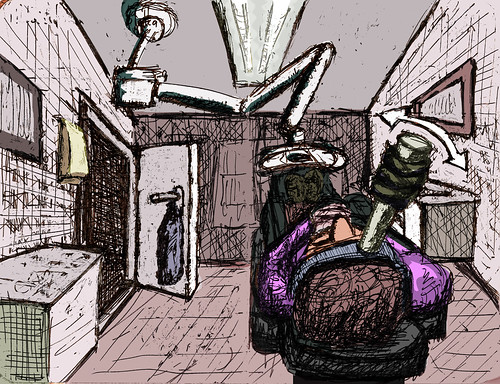
We may not realize it because we’re so used to them, but our bodies are pretty weird. Here are some of the strange, interesting, and sometimes disgusting features of these corporeal forms we call home.
1. Goose Bumps Are A Vestige Of Our Furry Past
You’re sitting around a campfire listening to a scary story. The storyteller is good, and you find yourself getting more and more spooked by the minute. Finally, with the chilling conclusion, your skin erupts in goose bumps, a physical manifestation of your internal fear. These days, goose bumps are just that: a dermatological representation of a variety of feelings (including fear, joy, surprise, and cold), a side effect with no real practical value. It turns out, however, that goose bumps were once a whole lot more useful to our ancestors. No, not great-great-grandpa—we’re talking hundreds of thousands of years ago, back when we had quite a bit more hair, also known as fur, covering our bodies. Just as with modern furry animals, goose bumps had two purposes for our hairier relatives: they helped increase insulation when temperatures drop, and also helped create the illusion of a larger, more menacing animal when threatened. We don’t have enough hair on our bodies for either of these things to really apply any more, but those once-useful goose bumps have stuck around.
2. Humans Shed 1.5 Pounds Of Skin Every Year
Our skin is pretty incredible. It’s our main line of defense against the elements, protecting our precious innards from the vicious dangers of the outside world. You undoubtedly know that your skin is capable of sloughing off its top layers; for example, if you’ve ever exfoliated your skin you know that you get a nice glow afterward, thanks to the fact that the dead, dull top layer of skin has been removed. Skin does a whole lot of sloughing on its own, too. In fact, in the next year you will shed approximately 1.5 pounds of skin particles. Assuming you live to a ripe old age, you’ll shed more than 100 pounds of skin over the course of your life. Some adults weigh about 100 pounds, which means you’ll slough off a person-sized pile of dead skin throughout the years. Where do all these skin particles go? Look no further than plain old household dust, which is largely comprised of dead skin.
3. You Can Survive Without Food Longer Than Without Sleep
Food, water, shelter, sleep—these are the basics for survival. But sometimes sleep takes the backburner in our priorities, especially in today’s busy, always-on-the-go society. Next time you consider depriving yourself of those blissful 7-8 hours of rest, however, you may want to think twice. Sleep is, in some ways, more vital than food: humans can generally go without food longer than without sleep. In 1965 a high school student named Randy Gardner set the world record for longest amount of time without sleep, clocking in at 11 days. On the other hand, there are many recorded instances of people going for more than a month without food, and sometimes much longer. So remember: don’t neglect your sleep! You need it just as much, if not more so, than food.
4. High-Pitched Noises = Predator Warning
You know that horrible, brain-exploding sound of nails on a chalkboard? Just like with goose bumps, the explanation for why we hate high-pitched sounds probably goes back to our non-human ancestors. It turns out that nails on a chalkboard sound quite similar to the warning cries of a macaque, a type of primate. It’s possible that way back in our lineage similar cries were used to alert the group of possible danger, and though we no longer use that type of communication, our brains are still hardwired to panic when we hear those types of sounds.
5. Your Flossing Habits Can Affect Your Heart Health
Every time you go in for a regular dental check up, the dental assistant reminds you, yet again, how important it is to floss your teeth regularly. Shrug off this recommendation no longer—not only is your dental health important for your mouth, but it might have an impact on your heart health as well. While researchers are still debating the evidence, it appears that the chronic, low-level inflammation associated with poor dental hygiene can actually contribute to heart disease. In fact, this type of inflammation plays a part in seven of the top ten causes of mortality in the United States, including cancer, stroke, and diabetes. So take your dentist seriously and floss regularly to save not only your mouth and your heart, but your entire body as well!
Madeline Marshall is a freelance writer based out of Santa Cruz, California who revels in all things weird.
